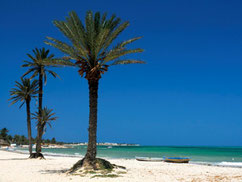Information about areas to visit in Tunisia
We have already commented that, despite its small size, Tunisia has much to offer the traveler, whatever their preferences. Culture, nature, adventure, cinema ... everything is possible.
On this page you will find the most important visits to be made including the areas declared World Heritage.
By making a circuit in Tunisia you will be able to know the great majority. It is also possible to organize a program with the most emblematic excursions in Tunisia.
Jem Amphitheater

The best preserved amphitheater in the world. The third in capacity after Rome and Verona. It can be visited in its entirety.
World heritage in 1979.
Bizerte
Bulla Regia

Remarkable archaeological city for its underground homes, only in warm areas during the Roman Empire.
Cap Bon

Green peninsula of 70 km. long filled with interesting places like the hot springs of Korbous or the caves of Haouaria.
Hammamet, tourist city par excellence, is included in this group.
Carthage

City that, once, it was more important than Rome herself. Its ruins are not as impressive as in other areas, but they are of great importance in the history of Tunisia and the world. World Heritage in 1979.
Dougga

The best preserved ruins of North Africa. Really exceptional, like a trip back in time. World Heritage in 1997.
Douz
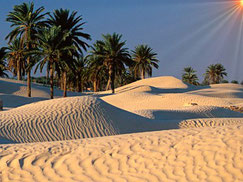
The "door of the desert". The last oasis before the Sahara.
Unforgettable sunsets and fun dromedary camel rides across the dunes.
Gabes
Djerba Island
Kairouan

Kairouan with his Great Mosque (AD 670), the center of North Africa's most holiest city. World Heritage in 1988.
Kef

This is the main city in northwestern Tunisia, being an important political and religious.
The city occupies an area of 2.500 hectares, 45 are within the ancient walls of the medina.
Ksar Ghilane Oasis
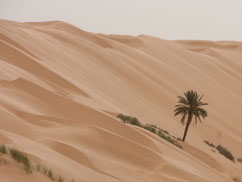
An oasis among the dunes of the desert. A magical and unforgettable visit. Possibility to spend the night in one of their camps. For the more adventurous, the Paradis camp; For those who prefer comfort, the Pansy.
Lake of Chott el Jerid
Mahdia

Port city with a rich past justified by its strategic position. Great fishing center. Especially selected for stays as it is somewhat remote.
Makthar
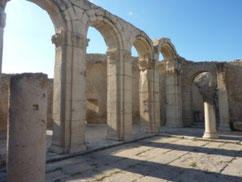
The old Maktaris. Exceptional archaeological city located in west-central of Tunisia. A large area with well-preserved remains.
Matmata
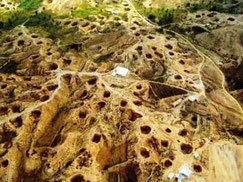
Some of the local Berber residents live in traditional underground "troglodyte" structures. Set for the film Star Wars.
Nefta

All the charm of the south without tourist masses. It draws attention to its beautiful decoration with small bricks.
Located next to Tozeur.
Mountain Oasis

The most famous oasis of the north of Tozeur located in the Atlas. Unforgettable landscapes and magical waterfalls. Near the border with Algeria. A must for lovers of photography.
Oung el Jemel

Oung Jemel, literally, the camel’s neck, is visited each year by thousands of tourists. Served as the shooting site of Star Wars and the English Patient.
Sbeitla
Sidi Bou Said

One of the most picturesque villages in Tunisia. The fame of its white and blue houses has crossed all borders. Located next to Carthage, nobody forgets. Exceptional views.
Called "the white and blue paradise".
Tabarka

It has been famous for its coral fishing, the Coral Festival of underwater photography and the annual jazz festival.
Tataouine

The region's largest and least populated of Tunisia. The place that inspired the planet Tatoine of George Lucas on Star Wars.
Thuburbo Majus

It is the fourth city in archaeological importance in Tunisia. Located in the north, its extension is so great that it has not yet been excavated in its entirety.
Tozeur
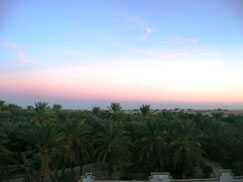
The oasis of Tunisia par excellence. The decoration of their houses, made of small bricks, offer a beautiful architecture.
Train Lezard Rouge
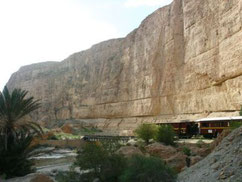
The most famous tourist train in southern Tunisia. Landscapes immersed in canyons and gorges.
Tunis capital

The economic and commercial capital of Tunisia.
Special mention to its Medina, site of the World Heritage by UNESCO in 1979.
The cost of hotels is higher.
Utique
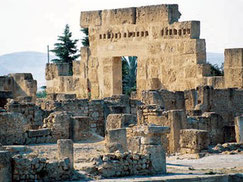
It is said that Utica was one of the first Phoenician trading posts to have been established on the soil of Africa, probably around 1100 BC. Older than Carthage, Utica for a long time played the role of capital before being overshadowed by her neighbour.





